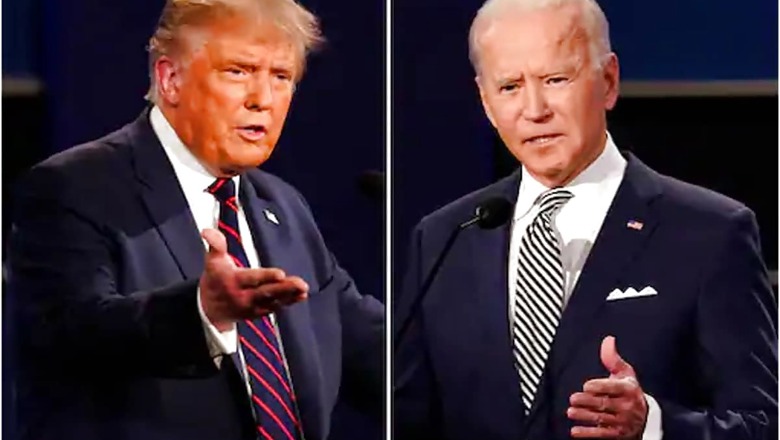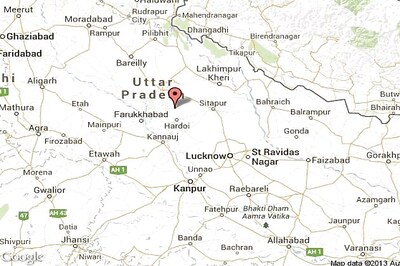
views
President Donald Trump is trying to stop former Vice President Joe Biden’s pathway to 270 electoral votes. The polls released over the weekend suggest that this will be a difficult, but not an impossible task.
Trump’s best path to stop Biden is for there to be a larger than average polling error in Arizona and especially Pennsylvania.
The electoral math is pretty simple. Biden needs to find 38 electoral votes on top of the 232 in the contests that Hillary Clinton won in 2016. He’s likely to win the one from Nebraska’s 2nd Congressional District. Remember, the state of Nebraska allocates an electoral vote to the winner of each of its congressional districts.
On top of that, Biden holds clear and significant leads in two states Trump won by less than a point in 2016: Michigan and Wisconsin. A CNN/SSRS poll on Saturday put Biden up 12 points in Michigan among likely voters, while Biden led in Wisconsin by 8 points in a CNN/SSRS poll and 11 points in a New York Times/Siena College poll released Sunday.
Those two states are worth a combined 26 electoral votes. Add in Nebraska’s 2nd Congressional District, you get Biden to 259 electoral votes.
This means Biden needs to get 11 more electoral votes. Other polls released on Saturday and Sunday from individual states worth at least 11 electoral votes suggest he will have options to choose from.
The hardest lift is probably in Florida. A New York Times/Siena College poll has Biden and Trump separated by 3 points, while an ABC News/Washington Post poll has the race within 2 points. Although the nominal leader in both was different, the polls combined indicate what has become clear for weeks. Florida and its 29 electoral votes are too close to call with perhaps a slight edge to Biden.
Biden could also get to 270 electoral votes with North Carolina and its 15 electoral votes. A CNN/SSRS poll had Biden up by 6 points there yesterday, while the polling average puts the race closer to a 3 point edge. This is a race that Biden is favored to win, though one where an average sized polling error (about 3 points in competitive presidential races dating back to 1972) would be enough for Trump to emerge victorious.
If Trump is able to take both Florida and North Carolina (along with Georgia which has similar polling to Florida), then you can begin to see how Trump could pull it off.
He would need to win in Arizona and Pennsylvania. Is that possible? Yes. Will it be easy? No.
Let’s start with Arizona. Biden had a 6 point advantage in a New York Times/Siena College poll put out on Sunday. CNN/SSRS had Biden at 50% and Trump at 46% on Saturday. The average poll overall has Biden up by 4 points. So Trump needs a larger than average polling error in a state where there hasn’t been a tradition of polling errors favoring Republicans.
If Trump is able to overcome that, he’ll still need to go into Pennsylvania and win there. (There’s a reason Trump has been barnstorming the state.)
Three polls out this weekend show similar results in the Keystone State. Biden was up 5 points in a Muhlenberg College poll (well within the poll’s 5.5 point margin of error), 6 points in a New York Times/Siena College poll and 7 points in an ABC News/Washington Post poll.
Overcoming an average 6 point polling deficit is possible. It’s quite hard though. It’s basically a little less than the chance of flipping a coin in the air three times and having it land on heads all three times.
As I’ve noted before, this isn’t 2016. Trump needs something to have a bigger polling miss. See it’s not only the state polls that need to be off by a considerable margin. Trump has to hope the national polls are off by plenty, too.
He’s down about 9 points nationally. An NBC/Wall Street Journal poll emphasizes that point with Trump trailing by 10 points in their final national poll released Sunday. Trump was down just 4 points in their final 2016 poll.
The national polls were quite good in 2016. And although the national margin and the margin in the state that ultimately determines the winner can differ (see 2016), there won’t be a 9 point gap between them. Nothing like that has ever been close to happening since the Republican Party was founded.
That means that whatever polling error hits the swing states needs to happen in the national polling as well, unlike in 2016.
This again is possible, though it is unlikely. That makes Biden a clear favorite and Trump a clear underdog with just two days to go until Election Day.
Read all the Latest News and Breaking News here



















Comments
0 comment